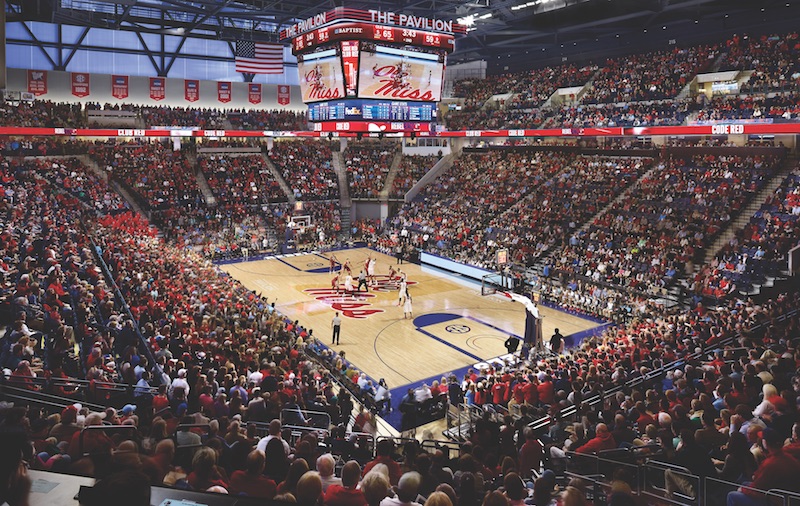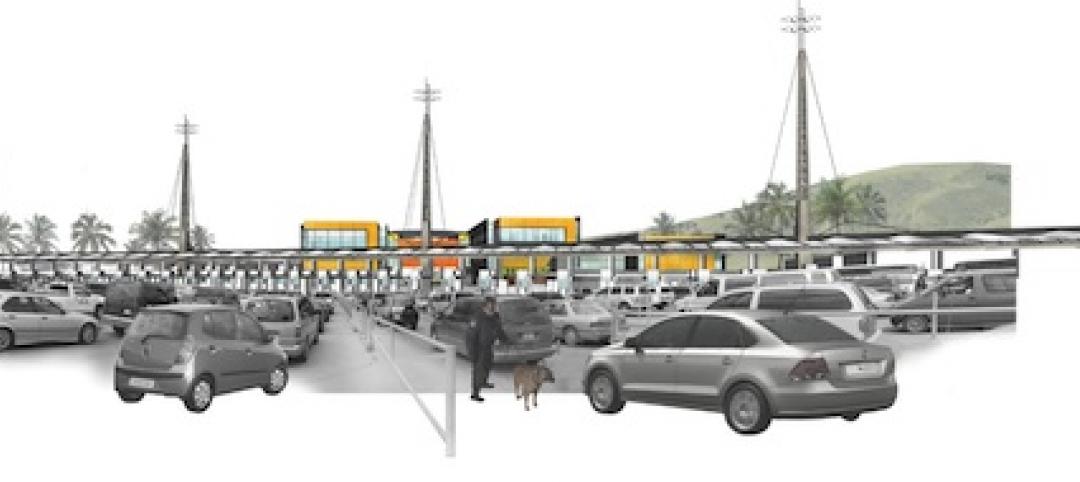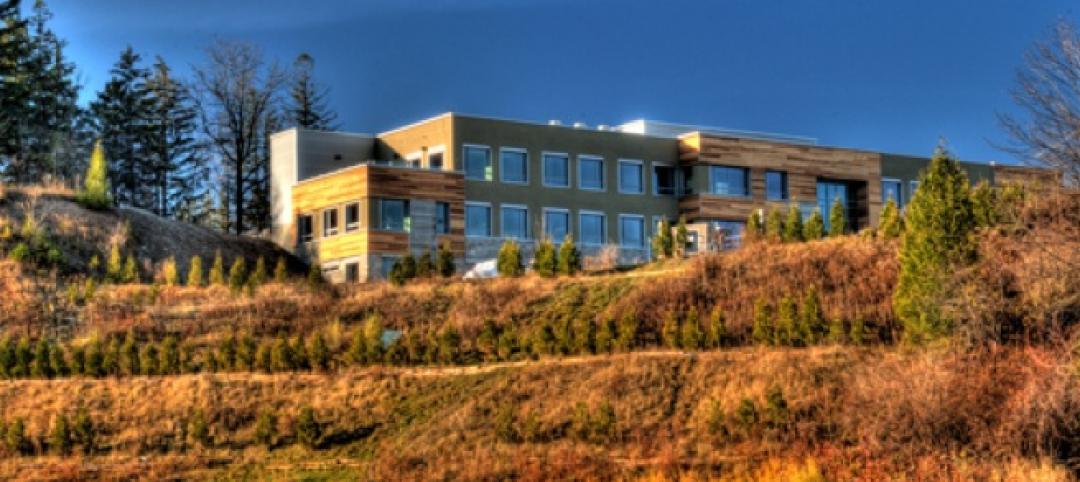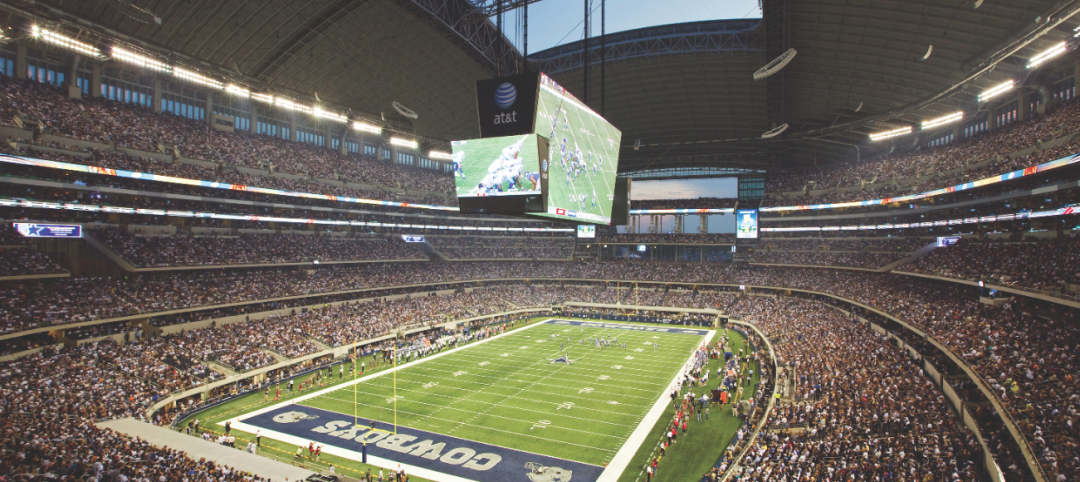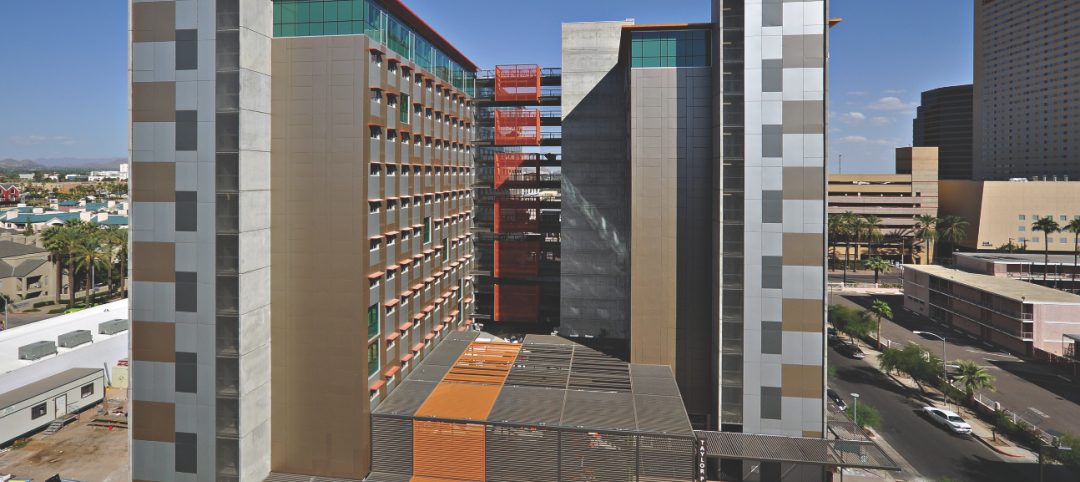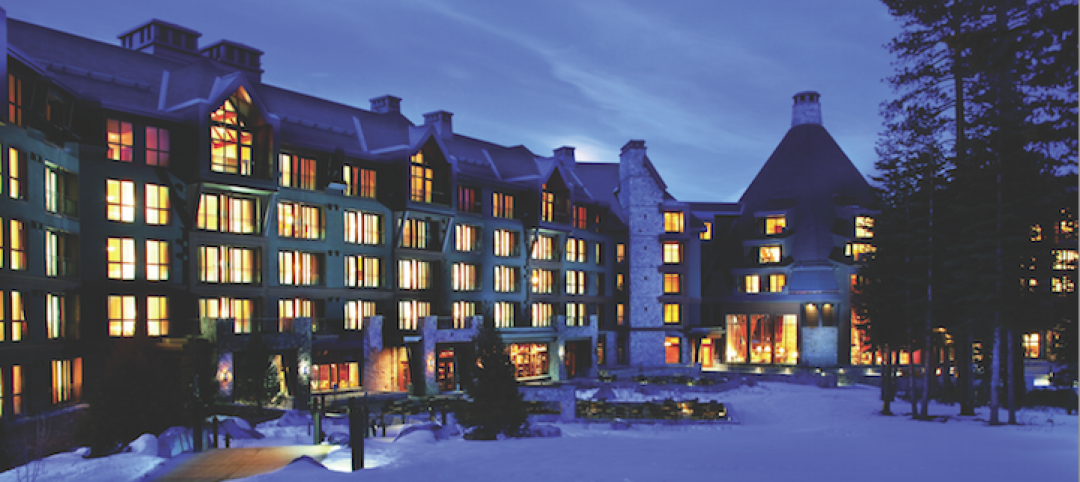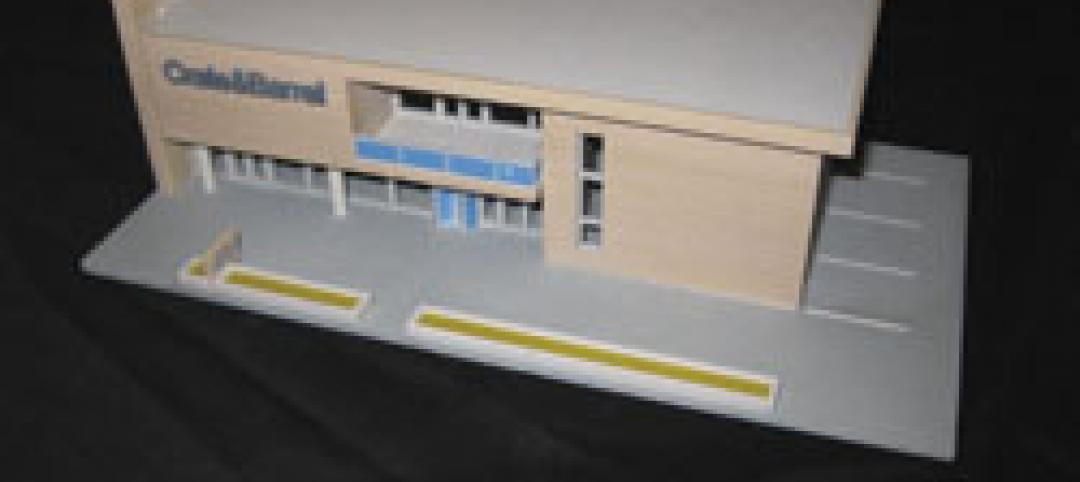The University of Nebraska Omaha’s hockey program has experienced modest success since its establishment in 1997, but last year marked the Crimson and Black’s first brush with the elite. The Mavericks reached the 2015 NCAA Frozen Four, the semifinal round of the NCAA Men’s Division I Ice Hockey Tournament.
TOP 50 SPORTS FACILITY ARCHITECTURE FIRMS
Rank, Firm, 2015 Revenue
1. Populous $113,741,160
2. HKS $81,220,737
3. HOK $58,589,000
4. Gensler $42,850,000
5. HNTB Corporation $13,419,171
6. Cuningham Group Architecture $10,238,235
7. Moody Nolan $9,800,000
8. Sink Combs Dethlefs $9,719,919
9. VOA Associates $9,577,715
10. Stantec $8,654,844
TOP 60 SPORTS FACILITY CONSTRUCTION FIRMS
Rank, Firm, 2015 Revenue
1. Mortenson Construction $837,136,000
2. AECOM $692,550,000
3. Turner Construction Co. $452,522,888
4. PCL Construction Enterprises $368,505,497
5. Manhattan Construction Group $277,528,000
6. Barton Malow Co. $266,882,651
7. Holder Construction Co. $154,000,000
8. Skanska USA $150,328,639
9. Brasfield & Gorrie $141,714,487
10. Pepper Construction Group $129,770,000
TOP 30 SPORTS FACILITY ENGINEERING FIRMS
Rank, Firm, 2015 Revenue
1. AECOM $30,000,000
2. Thornton Tomasetti $21,316,147
3. ME Engineers $18,950,000
4. Walter P Moore $18,678,163
5. WSP | Parsons Brinckerhoff $18,245,000
6. Henderson Engineers $18,179,333
7. Smith Seckman Reid $7,981,930
8. Jacobs $6,930,000
9. Magnusson Klemencic Associates $4,134,707
10. KJWW / TTG $3,320,000
UNO hockey’s good times keep rollin’ on. Last fall, the school opened the $86 million, 220,000-sf Baxter Arena, the team’s new home. Designed by HDR and Lempka Edson Architects, the 7,898-seat arena has 17 luxury suites, 750 club seats, and a 750-seat student section. Open concourses let fans see the game even when standing in line for concessions. A split bowl design keeps spectators on top of the ice.
The arena, which also hosts basketball and volleyball, isn’t just for UNO sports. The building is a focal point for the entire community. An attached community ice rink stands at the front of the building. (The UNO varsity plays on the main rink.) The public can access the community rink for open skate, curling, and club hockey. With 25-to-30-foot floor-to-ceiling windows, light is drawn in during the day; at night, visitors outside the building can peer in and see the ice.
In addition to concerts, shows, and lectures, Baxter Arena has emerged as the preferred setting for local graduation ceremonies. The Omaha World-Herald reported that 13 area high schools booked the arena for commencements this spring. The arena’s seating capacity is comfortably in between constrictive and cavernous. Free parking for 2,400 vehicles will easily accommodate all its guests.
Other schools are renovating existing structures or building new sports facilities that can serve the student body and surrounding community.
GAINING YEAR-ROUND USE
The 9,500-seat Pavilion at Ole Miss, in Oxford, Miss., opened in January. Home to the Rebels’ men’s and women’s basketball teams, the University of Mississippi’s multipurpose arena, designed by AECOM, also hosts concerts, events, and academic and student activities. A retractable lower bowl allows seating for group lectures and convocations.
The Pavilion Club on the eastern side of the arena serves as multi-use club space between basketball and football seasons. Since it’s right across a walkway from Vaught Hemingway Stadium, it will be a pre-game and game club during football season.
Even on non-game days during the week, students can access a food court just inside the north arena entry. It features two concession stands and comfortable seating, with a covered exterior plaza space.
MIXING SPORTS AND ACADEMICs in south bend
The University of Notre Dame is undertaking an even more complex sports/academic project. The South Bend, Ind., school is in the throes of turning Notre Dame Stadium into the hub of the campus. Total stadium capacity is being enlarged by 3,000–4,000 seats. Vinyl-clad benches are replacing wood bench seats, and a new video board and ribbon boards are being installed.
But the upgrade doesn’t stop at the stadium ticket window. Three new academic buildings are being built onto the stadium. The Campus Crossroads Project will add more than 800,000 sf of classroom, research, digital media, event, and student life space.
Nate Appleman AIA, LEED AP, HOK’s Director of Sports, Recreation, and Entertainment, says university officials looked at the site and determined that they had the room to turn the site into a focal point right in the core of campus. He says the question became, How does Notre Dame capitalize on that?
The nine-story Duncan Student Center sits on the west side. The first five floors contain fitness facilities, lounges, a meeting room, a career services center, a dining area, and a ballroom. The upper floors have gameday features like premium seating and booths for coaches and media.
The nine-story Corbett Family Hall, which houses the anthropology and psychology departments and a digital media center, sits on the east side. Its upper levels have the stadium press box, outdoor club seating, and club space. The seven-story Music and Sacred Music hall for the Department of Music and the Sacred Music program is located to the south. That facility has recital and rehearsal halls, a music library, and a lounge. Mechanical space for the scoreboard and football operations is on the uppermost story.
HOK was the sports, recreation, and hospitality consultant to S/L/A/M Collaborative (design architect). HOK designed in-stadium features, such as n loge boxes and press facilities. The new HOK-designed Student Recreation Center in the Duncan Student Center features an indoor track, a four-story climbing wall, boxing areas, and training turf. The facility triples the amount of fitness space available to students. The firm also designed terraces on each building that will offer views of the playing field and campus.
Appleman says that the concept of making a stadium into an environment that’s inhabited 365 days a year as a campus core building is an idea that’s replicable.
“This is going to be something that’s going to spread like wildfire throughout the college landscape, no doubt,” he says.
RETURN TO THE GIANTS 300 LANDING PAGE
Related Stories
| Sep 13, 2010
World's busiest land port also to be its greenest
A larger, more efficient, and supergreen border crossing facility is planned for the San Ysidro (Calif.) Port of Entry to better handle the more than 100,000 people who cross the U.S.-Mexico border there each day.
| Sep 13, 2010
Triple-LEED for Engineering Firm's HQ
With more than 250 LEED projects in the works, Enermodal Engineering is Canada's most prolific green building consulting firm. In 2007, with the firm outgrowing its home office in Kitchener, Ont., the decision was made go all out with a new green building. The goal: triple Platinum for New Construction, Commercial Interiors, and Existing Buildings: O&M.
| Sep 13, 2010
Stadium Scores Big with Cowboys' Fans
Jerry Jones, controversial billionaire owner of the Dallas Cowboys, wanted the team's new stadium in Arlington, Texas, to really amp up the fan experience. The organization spent $1.2 billion building a massive three-million-sf arena that seats 80,000 (with room for another 20,000) and has more than 300 private suites, some at field level-a first for an NFL stadium.
| Sep 13, 2010
'A Model for the Entire Industry'
How a university and its Building Team forged a relationship with 'the toughest building authority in the country' to bring a replacement hospital in early and under budget.
| Sep 13, 2010
Committed to the Core
How a forward-looking city government, a growth-minded university, a developer with vision, and a determined Building Team are breathing life into downtown Phoenix.
| Sep 13, 2010
Conquering a Mountain of Construction Challenges
Brutal winter weather, shortages of materials, escalating costs, occasional visits from the local bear population-all these were joys this Building Team experienced working a new resort high up in the Sierra Nevada.
| Sep 13, 2010
Data Centers Keeping Energy, Security in Check
Power consumption for data centers doubled from 2000 and 2006, and it is anticipated to double again by 2011, making these mission-critical facilities the nation's largest commercial user of electric power. With major technology companies investing heavily in new data centers, it's no wonder Building Teams see these mission-critical facilities as a golden opportunity, and why they are working hard to keep energy costs at data centers in check.
| Sep 13, 2010
3D Prototyping Goes Low-cost
Today’s less costly 3D color printers are attracting the attention of AEC firms looking to rapidly prototype designs and communicate design intent to clients.
| Aug 11, 2010
Cubellis principals reorganize as CI design
Former principals of Cubellis Inc. have formed ci design "with a stellar group of projects in the United States and internationally," states John Larsen who, with Richard Rankin and Christopher Ladd, is leading the architecture and planning firm.
| Aug 11, 2010
Leo A Daly changes name of STH, completes acquisition
LEO A DALY has changed the name of STH Architectural Group to the name of its parent company, Leo A Daly. STH was acquired in February 2009 as a strategic move to accelerate growth in its core business sectors and to strengthen the firm's presence in the Florida market.


